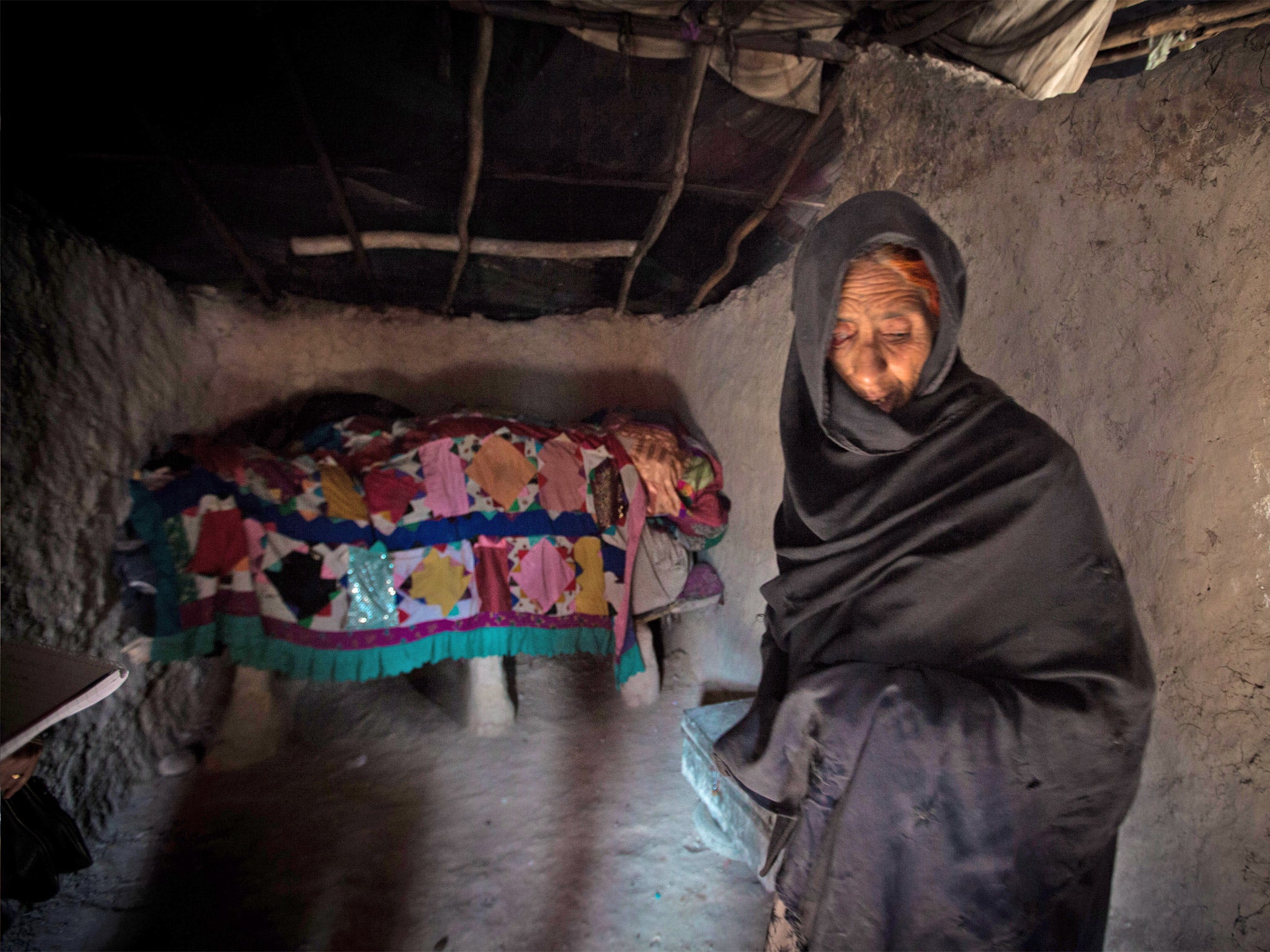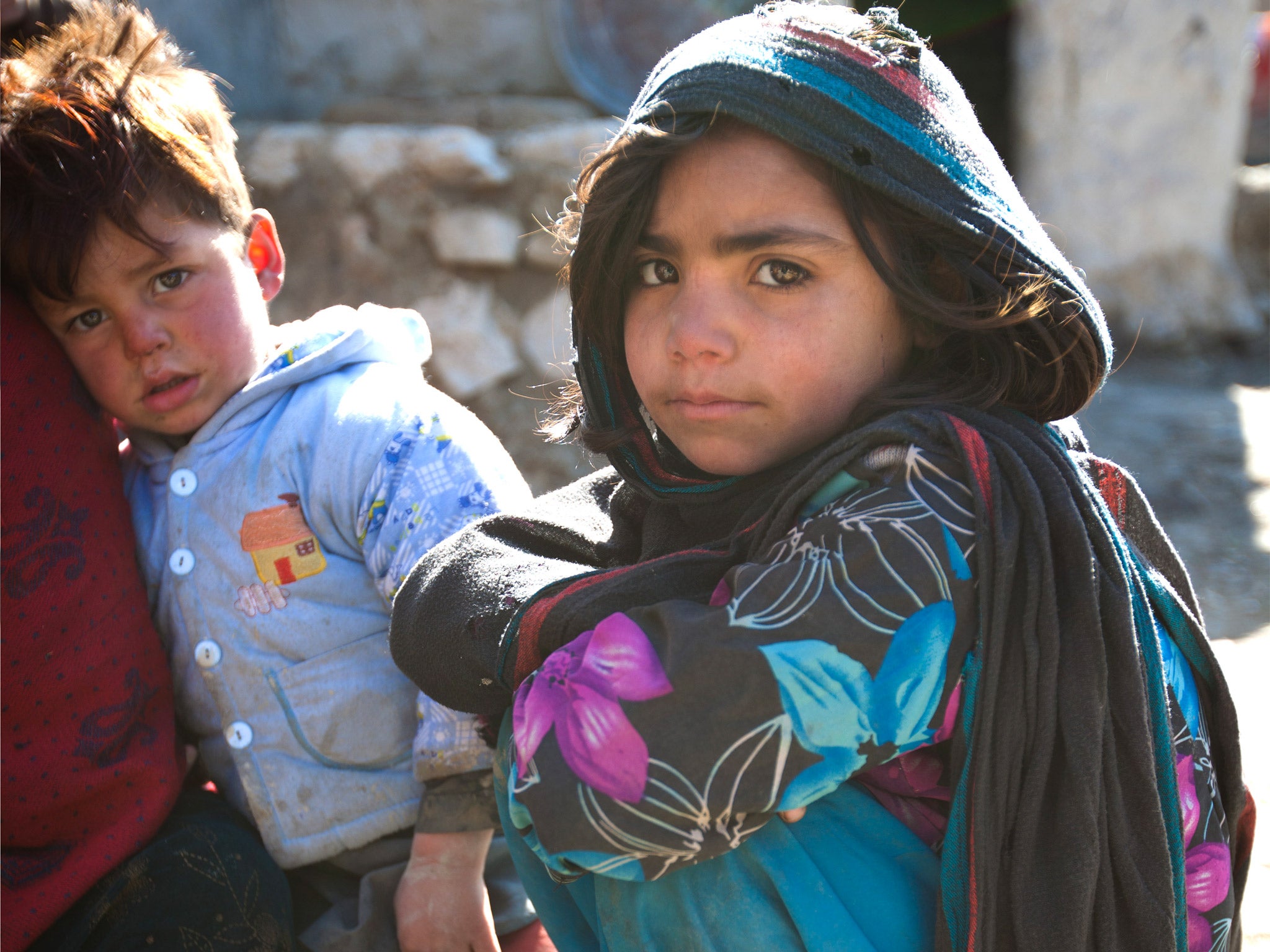Afghanistan abandoned without hope as international aid for the war-ravaged nation plunges by 40 per cent
Elections looming, Nato forces pulling out and - although it is almost April - less than one fifth of the UN’s humanitarian plan for this year has been funded

It has been two years since Nato bombs forced Niaz Bibi to flee her home in Lashkar Gar, in Afghanistan’s Helmand province. The attack took away her husband, daughter and four grandchildren, as well as the sight in her right eye.
Ms Bibi, who guesses that she is about 60 years old, now lives in Nasaji Bagramy, one of Kabul’s 53 camps for internal refugees. Her mud-walled home is covered with the white-and-blue United Nations tarpaulin familiar to arid disaster zones around the world, but this is winter in the Afghan capital and it has snowed for much of the week.
“In this cold weather we are sitting on the floor with nothing,” she said. “There are nine of us living together but we cannot buy more than five or six naan breads a day. We don’t have oil, tea or sugar. We eat only bread.”
Her family survives on the proceeds of her grandchildren’s begging – typically between 10p and 30p a day – as well as charity handouts of food and charcoal. One of her grandsons, Rahman, 10, whose mother was killed in the Nato attack, is covered in jagged scars from a hit-and-run accident last year. The car struck when he was out in the road collecting scraps of rubbish for the fire.
“I’d like to ask Nato to stop bombing us – to stop the conflict in Afghanistan and to bring peace,” Ms Bibi says. As the last of the international troops pack up and go, it is likely that her first wish will come true, but the latter is a distant hope.
Insecurity is already mounting ahead of the presidential election on 5 April. While the past decade has seen some improvements, most notably in health and education, this progress looks perilously unstable. A report published by Islamic Relief today warns that the country is in danger of slipping backwards as Nato forces pull out and international aid budgets for the country drop off a cliff.
Between 2011 and 2013 aid funding for Afghanistan plummeted by 40 per cent, to $508m (£309m). It is almost April, yet less than one fifth of the UN’s humanitarian plan for the year has been funded.
The welfare situation is still critical. One million children under five are acutely malnourished, 54 per cent of girls do not go to school and war has displaced 630,000 Afghans within their own country.
Farzana Balooch, of Islamic Relief Afghanistan, said: “The international community largely abandoned Afghanistan in the 1990s after the end of the Soviet occupation – a withdrawal that paved the way for the rise of Taliban and is now seen by many observers as a huge mistake. Yet, as the end of 2014 approaches, we are seeing signs that Afghanistan is being abandoned again.”
Donor fatigue and security fears have contributed to dwindling budgets, as well as the view that it is now unnecessary to bolster military missions with “hearts and minds” humanitarian work. Corruption and badly managed projects have also put off international donors, with the country ranked in the top three most corrupt in the world by Transparency International for two years in a row.
The ancient city of Bamyan was one of Afghanistan’s premier tourist attractions in more peaceful times. Known for its palace of Genghis Khan and the Great Buddhas carved into its sandstone cliffs by ancient monks, it lies in the mountains 80 miles north-west of Kabul. The Taliban blew the Great Buddhas to pieces in 2001 and the caves either side of the giant scars where they once stood are now home to more than 100 of some of the province’s poorest families.

Halima Abdullah, 53, lives in one of the caves. She had to flee to nearby Fallodi when the Taliban came, but that did not keep her family safe. “My husband, Abdullah, was killed by the Taliban and my uncle and other relatives,” she says, trying to count out the losses on her fingers. “My husband was in front of the house [in Fallodi] when the Taliban came and shot him. After that, we had too many problems with food and bad living conditions.”
When the Taliban attacked Bamyan in the 1990s, they were ruthless. The province had been a stronghold for mujahideen forces and its population was almost entirely made up of Hazara people, a minority ethnic group.
Ms Abdullah’s son Jawed, 33, fled to Iran when the Taliban came. Other men in Fallodi managed to escape by dressing in women’s clothes and running away.
Jawed is now back living with his mother in the cave; its mud walls have been expanded to several rooms to fit in their two families. He works as a labourer, making between £1 and £1.50 a day. Often this money has to support his mother, three brothers and three sisters, as well as his own young children.
Over the past decade, Bamyan has built a reputation as Afghanistan’s most peaceful province and, as a result, has attracted international investment – but it is still one of the poorest parts of the country. Dr Khalil Rahman Anwari, the Bamyan project manager for the not-for-profit Agency for Assistance and Development of Afghanistan, said: “Bamyan has witnessed a lot of advances since the fall of the Taliban.
“If you compare the health situation to 10 years ago, there have been lots of improvements. Before, there was a single hospital in Bamyan. Now there are 99 health facilities and 1,000 health posts.
“But [their] sustainability and affordability is a major concern because all these are standing on the aid of the international community. How we will afford to keep them running is a concern. The drugs, the salaries and the equipment all come from the US Agency for International Development.”
Before the Taliban came, Ms Abdullah’s family was familiar with the hardships of living in draughty caves. She lost two of her young children to pneumonia when they were toddlers, 18 and 16 years ago. “We took them to the doctor but they had died,” she says. “Now there is a better hospital and it is close. I don’t think it would happen [again].”
One of the greatest advances in Bamyan has been made in women’s rights. Women have far more freedoms than elsewhere in the country and can usually work, learn and walk around without men.
Yet as insecurity grows elsewhere, Bamyan’s residents fear their way of life may be under threat again. “I’m very worried that if the Taliban come back they will kill everybody,” Ms Abdullah says. “We always pray, all day and all night that the Taliban will not come back. I’m worried about [what will happen after] the election.”
Addiction is still one of Afghanistan’s biggest problems. More than a million people are hooked on heroin and opium, yet the national budget to deal with the drug problems is just £1.4m.
Attempts to curb opium production have been disastrous. International forces have frequently chosen to turn a blind eye and appease farmers, rather than further alienate rural populations that often rely on poppy growth as their only income. Opium cultivation reached record levels last year, with more than 200,000 hectares planted with poppy for the first time, according to the UN.
The opium-growing area around Camp Bastion, Britain’s main military base in the country, nearly quadrupled between 2011 and 2013, with more than 19,000 hectares of poppy fields counted.
More than three decades of instability have fuelled drug production. The mujahideen used opium farming as a weapon against the Soviets, hoping to get the occupiers addicted. Now the Taliban is heavily involved in the trade, using the proceeds to buy artillery. While some provinces have offered incentives to stop drug cultivating, leaders in Balkh decided to use religion. The province near the border with Uzbekistan has long been a trafficking route for drugs, but poppy farming has been all but eradicated after cultivators were persuaded by imams to give up.
Dr Mohammad Ehsan Hamrah, project co-ordinator for an Islamic Relief treatment centre in Shortepa, explains: “No alternative was offered to people but religious leaders came together and decided to convince people to stop the farming of the drug because it is haram [forbidden under Islam].”
Addiction is still a major problem, however. Abdullah Hanifi, 23, is one of the in-patients at the Shortepa treatment centre. He started using drugs while working as a labourer. Sitting cross-legged in a cramped ward of six beds, Mr Hanifi explains: “I felt stronger and was able to work more, but gradually it made me feel weak.”
At the height of his addiction he was using 4.5 grams of opium a day, spending £1.50 that could have fed his wife and three children. “When I went home, my family couldn’t tell me anything because they were afraid that I would get angry and throw things,” he says.
He has been clean for three days and, if he can avoid drugs for 18 days, he will return home. He is angry at how little the government does to tackle drugs. “Opium is very easily available in Shortepa, which is why many young people are addicted a lot in this area,” he says. “We have police here and relevant government departments who all know that drugs are being sold and they are not taking any action.”
Michael Keating, a former deputy UN envoy to Afghanistan, believes the country’s humanitarian needs are likely to grow. He says: “This is an uncomfortable reality, given the billions of aid dollars that have been spent by western donors. The economy is contracting, and already meagre incomes are disappearing as international forces leave, investments and aid levels drop.
“The focus must now be on how to use less aid more effectively to create jobs and build poor peoples’ resilience. But, in the meantime, immediate humanitarian needs are likely to increase, especially if there is more violence.”
Taliban strikes: Kabul attack kills six
Taliban suicide bombers and gunmen have attacked an election commission office in Kabul next to the home of presidential candidate Ashraf Ghani, rattling nerves in the Afghan capital less than two weeks before an important election.
Kabul is on high alert ahead of the 5 April vote that Taliban insurgents have threatened to derail with a campaign of bombings and assassinations. Mr Ghani, a former World Bank official, was not at home at the time of the attack, for which the Taliban claimed responsibility.
Security forces cordoned off the area in western Kabul and besieged the building. “The operation is over,” the Deputy Interior Minister, General Ayoub Salangi, said. “Five enemies were killed and all election workers trapped inside were rescued.”
Five more people, including two police officers and a provincial council candidate were killed in the attack. Other incidents included a suicide bomb assault on a traditional horseback buzkashi match in the northern city of Kunduz in which six civilians died.
Security is tight ahead of the ballot, which, if successful, will mark Afghanistan’s first democratic transfer of power.
Reuters
Join our commenting forum
Join thought-provoking conversations, follow other Independent readers and see their replies
Comments